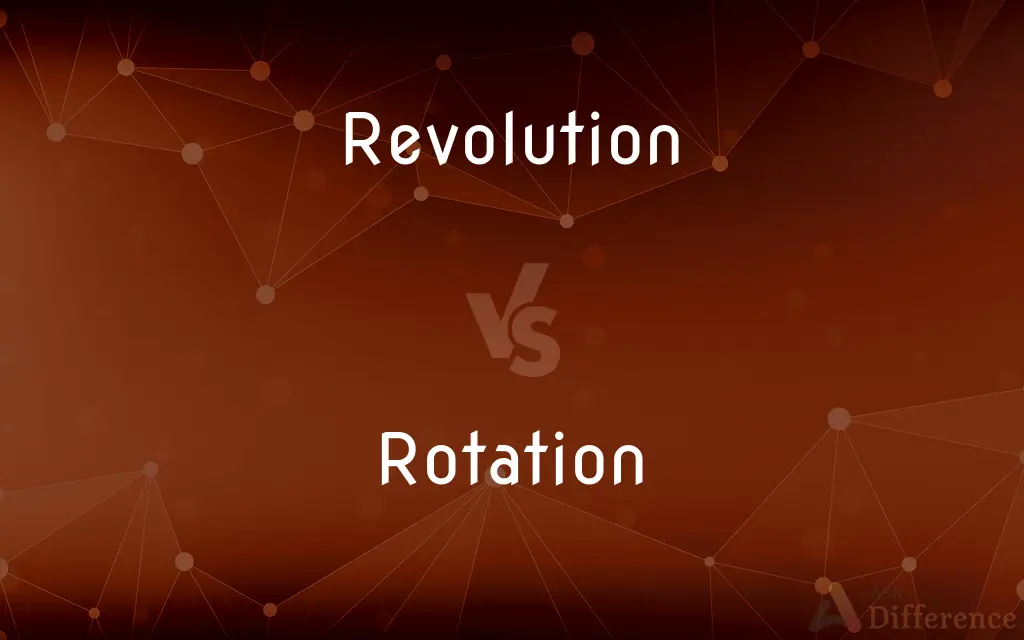Revolution vs. Rotation — What's the Difference?
By Tayyaba Rehman — Updated on September 15, 2023
Revolution refers to an object's movement around another or a radical change in structure or organization. Rotation denotes an object's spin on its own axis. While both involve motion, revolution is orbital or transformative, and rotation is axial.

Difference Between Revolution and Rotation
Table of Contents
ADVERTISEMENT
Key Differences
Revolution, in astronomical terms, describes the motion of one celestial body as it moves in an orbit around another. For instance, Earth's revolution around the sun is what gives us our year. Conversely, rotation is the spin of a celestial body on its own axis, like Earth's daily rotation giving us day and night. These terms, while both dealing with movements, are distinctive in their pathways.
Beyond astronomy, revolution also alludes to a profound change in political, social, or economic structures. History is replete with instances of societal revolutions that have reshaped nations. Rotation, in a different context, might pertain to a regular sequence or a cyclic procedure, such as rotation of crops or job roles.
In terms of frequency, an object's rotation can occur much more rapidly than its revolution. The Earth, for instance, completes one rotation every 24 hours, while its revolution around the sun takes a year. This distinction emphasizes the swiftness of a spin in comparison to an orbital path.
While the terminologies are straightforward in certain contexts like astronomy, in varied contexts they acquire nuanced meanings. Rotation typically remains linked to cycles or sequences, while revolution can signify major shifts or orbital movements.
Comparison Chart
Definition
Orbital movement around another object or radical change.
Spin of an object around its axis.
ADVERTISEMENT
Frequency
Often slower.
Can be faster.
Context
Astronomical or societal/political change.
Astronomical or cyclic sequence.
Resultant Effect
Defines larger time cycles or significant changes.
Defines shorter time cycles.
Motion Pathway
Orbital or transformative.
Axial.
Compare with Definitions
Revolution
A significant change in societal structures.
The French Revolution drastically altered European politics.
Rotation
The action of spinning around an axis.
The Earth's rotation gives us day and night.
Revolution
A sudden or major instance of change.
The digital revolution transformed global communication.
Rotation
A recurring sequence in a set pattern.
Farmers use crop rotation to enrich the soil.
Revolution
An overthrow of a system or government.
Many revolutions in history have sought to establish democracy.
Rotation
The replacement of an individual or item in a sequence.
He joined the team in the latest rotation.
Revolution
A cycle or recurrence of stages.
The revolution of fashion trends is ceaseless.
Rotation
A turning or circular movement.
The wheels' rotation drives the car forward.
Revolution
Movement of one object around another.
The Earth completes one revolution around the Sun in a year.
Rotation
A regular interchange of position.
The rotation of duties ensures that all staff get experience.
Revolution
In political science, a revolution (Latin: revolutio, "a turn around") is a fundamental and relatively sudden change in political power and political organization which occurs when the population revolts against the government, typically due to perceived oppression (political, social, economic) or political incompetence. In book V of the Politics, the Ancient Greek philosopher Aristotle (384–322 BC) described two types of political revolution: Complete change from one constitution to another Modification of an existing constitution.Revolutions have occurred through human history and vary widely in terms of methods, duration and motivating ideology.
Rotation
A rotation is a circular movement of an object around a center (or point) of rotation. The geometric plane along which the rotation occurs is called the rotation plane, and the imaginary line extending from the center and perpendicular to the rotation plane is called the rotation axis ( AK-seez).
Revolution
Orbital motion about a point, especially as distinguished from axial rotation
The planetary revolution about the sun.
Rotation
The act or process of turning around a center or an axis
The axial rotation of the earth.
Revolution
A turning or rotational motion about an axis.
Rotation
A single complete cycle of such motion.
Revolution
A single complete cycle of such orbital or axial motion.
Rotation
(Mathematics) A transformation of a coordinate system in which the new axes have a specified angular displacement from their original position while the origin remains fixed.
Revolution
The overthrow of one government and its replacement with another.
Rotation
Regular and uniform variation in a sequence or series
A rotation of personnel.
Crop rotation.
Revolution
A sudden or momentous change in a situation
The revolution in computer technology.
Rotation
The sequence in which the starting pitchers on a team pitch in games.
Revolution
(Geology) A time of major crustal deformation, when folds and faults are formed.
Rotation
The pitchers used in such a sequence
A team with an excellent rotation.
Revolution
A political upheaval in a government or state characterized by great change.
Rotation
The act of turning around a centre or an axis.
The earth's rotation about its axis is responsible for its being slightly oblate rather than a sphere.
Revolution
The removal and replacement of a government, especially by sudden violent action.
Rotation
A single complete cycle around a centre or an axis.
Earth's moon completes a rotation every twenty-seven days or so.
Revolution
Rotation: the turning of an object around an axis, one complete turn of an object during rotation.
Rotation
A regular variation in a sequence, such as to even-out wear, or people taking turns in a task; a duty roster.
Applying crop rotation to a field avoids depleting soil nutrients the way repeated use of a single crop might do.
In rotation, each member of the group would be responsible for the beacon fire.
The medical resident finished a two-week rotation in pediatrics and began one in orthopaedics.
Revolution
In the case of celestial bodies, the traversal of one body along an orbit around another body.
Rotation
An operation on a metric space that is a continuous isometry and fixes at least one point.
The function mapping (x,y) to (−y,x) is a rotation.
Revolution
A sudden, vast change in a situation, a discipline, or the way of thinking and behaving.
Rotation
(baseball) The set of starting pitchers of a team.
Revolution
A round of periodic changes, such as between the seasons of the year.
Rotation
(aviation) The step during takeoff when the pilot commands the vehicle to lift the nose wheel off the ground during the takeoff roll. (see also: V2)
Revolution
Consideration of an idea; the act of revolving something in the mind.
Rotation
Repeated play on a radio station, etc.
The new single enjoyed heavy rotation on MTV.
Revolution
The act of revolving, or turning round on an axis or a center; the motion of a body round a fixed point or line; rotation; as, the revolution of a wheel, of a top, of the earth on its axis, etc.
Rotation
The act of turning, as a wheel or a solid body on its axis, as distinguished from the progressive motion of a revolving round another body or a distant point; thus, the daily turning of the earth on its axis is a rotation; its annual motion round the sun is a revolution.
Revolution
Return to a point before occupied, or to a point relatively the same; a rolling back; return; as, revolution in an ellipse or spiral.
That fearComes thundering back, with dreadful revolution,On my defenseless head.
Rotation
Any return or succesion in a series.
Revolution
The space measured by the regular return of a revolving body; the period made by the regular recurrence of a measure of time, or by a succession of similar events.
Rotation
Pertaining to, or resulting from, rotation; of the nature of, or characterized by, rotation; as, rotational velocity.
Revolution
The motion of any body, as a planet or satellite, in a curved line or orbit, until it returns to the same point again, or to a point relatively the same; - designated as the annual, anomalistic, nodical, sidereal, or tropical revolution, according as the point of return or completion has a fixed relation to the year, the anomaly, the nodes, the stars, or the tropics; as, the revolution of the earth about the sun; the revolution of the moon about the earth.
Rotation
The act of rotating as if on an axis;
The rotation of the dancer kept time with the music
Revolution
The motion of a point, line, or surface about a point or line as its center or axis, in such a manner that a moving point generates a curve, a moving line a surface (called a surface of revolution), and a moving surface a solid (called a solid of revolution); as, the revolution of a right-angled triangle about one of its sides generates a cone; the revolution of a semicircle about the diameter generates a sphere.
Rotation
(mathematics) a transformation in which the coordinate axes are rotated by a fixed angle about the origin
Revolution
A total or radical change; as, a revolution in one's circumstances or way of living.
The ability . . . of the great philosopher speedily produced a complete revolution throughout the department.
Rotation
A single complete turn (axial or orbital);
The plane made three rotations before it crashed
The revolution of the earth about the sun takes one year
Revolution
A fundamental change in political organization, or in a government or constitution; the overthrow or renunciation of one government, and the substitution of another, by the governed.
The violence of revolutions is generally proportioned to the degree of the maladministration which has produced them.
Rotation
A planned recurrent sequence (of crops or personnel etc.);
Crop rotation makes a balanced demand on the fertility of the soil
The manager had only four starting pitchers in his rotation
Revolution
A drastic and far-reaching change in ways of thinking and behaving;
The industrial revolution was also a cultural revolution
Revolution
The overthrow of a government by those who are governed
Revolution
A single complete turn (axial or orbital);
The plane made three rotations before it crashed
The revolution of the earth about the sun takes one year
Common Curiosities
Does revolution always indicate a political change?
No, while revolution can mean political change, it also denotes orbital movement in astronomy.
Can revolution mean a return to a previous state?
Yes, in some contexts, revolution implies a cyclic return.
Which takes longer, Earth's rotation or revolution?
Earth's revolution (1 year around the Sun) takes longer than its rotation (24 hours).
Is rotation always about celestial bodies?
No, rotation can refer to any object spinning on its axis or a sequence.
Can rotation mean a change in position?
Yes, rotation can refer to an interchange of position, as in job roles.
Do all planets have both rotation and revolution?
Yes, most planets both rotate on their axes and revolve around their stars.
What determines the speed of rotation?
Factors like size, mass, and external forces can influence rotation speed.
How often does the Earth complete a rotation?
The Earth completes one rotation approximately every 24 hours.
How does rotation affect weather patterns?
Earth's rotation influences phenomena like the Coriolis effect, impacting weather.
Is every rotation visible to the naked eye?
No, some rotations, like those of certain celestial bodies, are too slow or distant to perceive easily.
What's another word for a societal revolution?
Uprising, rebellion, or revolt can be synonymous with societal revolution.
What's a non-astronomical example of revolution?
The Industrial Revolution, which transformed manufacturing processes, is an example.
Does every revolution result in a change in power?
Not always. Some revolutions might not achieve their goals, while others result in significant change.
Is the revolution of one object always around another object?
In astronomy, yes. In other contexts, revolution can mean change without orbital movement.
Can rotation result in day and night?
Yes, on Earth, the rotation causes the cycle of day and night.
Share Your Discovery

Previous Comparison
Gun vs. Rifle
Next Comparison
Pike vs. PickerelAuthor Spotlight
Written by
Tayyaba RehmanTayyaba Rehman is a distinguished writer, currently serving as a primary contributor to askdifference.com. As a researcher in semantics and etymology, Tayyaba's passion for the complexity of languages and their distinctions has found a perfect home on the platform. Tayyaba delves into the intricacies of language, distinguishing between commonly confused words and phrases, thereby providing clarity for readers worldwide.














































